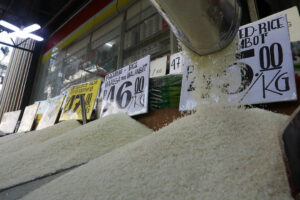




January Economic Update: Growth slows, prices rise
 DOWNLOAD
DOWNLOAD

Inflation Update: Up, up, and away?
 DOWNLOAD
DOWNLOAD

Quarterly Economic Growth Release: Growth takes on a slower pace
 DOWNLOAD
DOWNLOAD


Lower rice tariffs to bring down retail prices as early as July

The government’s move to slash tariffs on imported rice could bring down average retail prices by PHP 6-PHP 7 per kilo as early as July, the Department of Agriculture (DA) said on Wednesday.
“The potential price reduction will be between P6 and P7 per kilo… In a month’s time we can expect that the prices would drop,” Agriculture Assistant Secretary and Spokesperson Arnel V. De Mesa said in a virtual briefing.
He said consumers could see the drop in retail prices of imported rice by July or August, noting that it takes around two to three weeks for imports to arrive in the country.
The National Economic and Development Authority (NEDA) Board has approved a medium-term plan to lower tariffs on agricultural and industrial products. This included the further reduction in rice import tariffs to 15% from 35% until 2028.
“We will do everything within our power to make sure the substantial cut in rice tariff will translate to a significant reduction in retail price of the grain,” Agriculture Secretary Francisco P. Tiu Laurel, Jr. said in a separate statement.
According to the DA’s Price monitoring of Metro Manila markets as of June 4, a kilo of imported well-milled rice was PHP 52-PHP 55, while regular milled rice was PHP 49-PHP 51 per kilo.
The Department of Finance earlier said that it is willing to forego an estimated P10 billion in tariff collections to lower the price of the food staple.
Mr. Tiu Laurel said the agency will plug the potential funding gaps for the Rice Competitive Enhancement Fund (RCEF). RCEF is funded by tariff collections on rice imports, mandated under Republic Act No. 11203, the Rice Tariffication Law.
“Our priority is to ensure that our rice farmers will continue to benefit from the Rice Fund created under the Rice Tariffication Law and is confident it will be extended until 2030 to improve the lives of millions of impoverished rice farmers,” he said.
The DA is seeking to extend RCEF and bring back some regulatory powers to the NFA to bring down rice prices.
LOWER INFLATION
Meanwhile, HSBC economist for ASEAN (Association of Southeast Asian Nations) Aris D. Dacanay said the implementation of lower tariffs on key commodities would likely help cool inflation,
The consumer price index (CPI) may ease by as much as 1.8 percentage points if the government swiftly implements the lower tariffs on rice, corn, pork and mechanically deboned meat, he said at a media briefing.
“But if, let’s say, the rice tariff rate cut happens tomorrow, or happens within June, I do think that’s a big downside risk to the inflation outlook, and perhaps, you know, inflation will not breach target,” he said.
Annual inflation quickened for a fourth straight month in May. Inflation rose to 3.9% year on year in May from 3.8% in April but slowed from 6.1% in the same month last year.
May marked the sixth straight month that inflation settled within the central bank’s 2-4% target band.
Mr. Dacanay said inflation may likely breach the government’s 2-4% target until July due to unfavorable base effects.
“It’s going to range between 4% and 4.5%, perhaps up until July. It’s only in August where it will return back to within target,” he said. — Adrian H. Halili with inputs from B.M.D.Cruz
This article originally appeared on bworldonline.com





 By BusinessWorld
By BusinessWorld